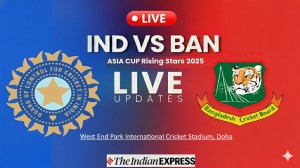Faced with Sept limit, EC in fix over Bihar poll date
Thanks to the sudden dissolution of the Bihar Assembly, the Election Commission (EC) is facing an unprecedented dilemma, given its prerogati...

Thanks to the sudden dissolution of the Bihar Assembly, the Election Commission (EC) is facing an unprecedented dilemma, given its prerogative to decide the date for the fresh poll.
In theory, the EC can hold the election any time before November 22 — which marks the end of six months after the dissolution. The EC is entitled to so much time on account of the Supreme Court’s advice in 2002 on the Presidential reference in the Gujarat case.
But in practice, the EC finds itself obliged to hold the election before September 6, when the six-month term of the President’s Rule is due to expire. The time available to the EC seems to be thus truncated because it cannot proceed on the assumption that Parliament will necessarily extend the term of the President’s Rule.
If the Parliament does not for any reason extend the President’s Rule by September 6, there will be a Constitutional vacuum in Bihar, unless the EC holds the poll by then.
Even otherwise, when it begins its poll preparations, the EC will have to go by the existing term of the President’s Rule and fix a date that ensures that the next Assembly is constituted before September 6.
The three-member commission is learnt to be exploring all possible scenarios to see whether the only tenable option is to hold the poll sooner rather than later.
The timing of the election has assumed political significance, as the UPA has made it known that it would prefer the poll to be held well after the monsoon, while the NDA has been clamoring for an immediate contest.
LJP rebel wants proof on horse-trading
PATNA: Following allegations by RJD leader and Union minister Raghuvansh Prasad Singh that the NDA had offered each of the rebel LJP MLAs Rs 3 crore for supporting it to form the govt in Bihar, LJP MLA (of the dissolved Assembly) Munna Shukla has sent a legal notice to Singh to prove his accusation in 10 days. Meanwhile, 14 of the 17 independent MLAs have decided to challenge the dissolution of Assembly in Supreme Court. —PTI



- 01
- 02
- 03
- 04
- 05




























